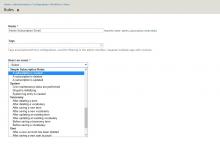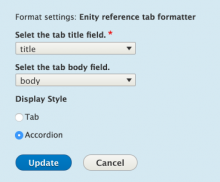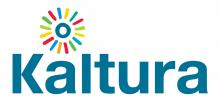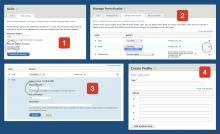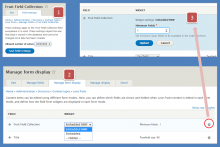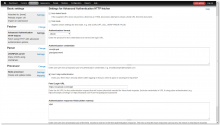Add functionality and customize your Drupal application with thousands of projects contributed by our amazing community.
A module is code that extends Drupal's by altering existing functionality or adding new features. You can use modules contributed by others or create your own. Learn more about creating and using Drupal modules.
This module allow you to automatically publish, update or delete content on OpenAgenda through the
Adds Rules support for the Simple Subscription module.
Provides rules reaction events for:
This module integrates the TaxJar service with Ubercart.
The TaxJar platform provides automated sales tax calculation, reporting, and filing for your business.
The module provides a file type field formatter that converts the attached pdf file to an image slideshow.
Simple Tab Field formatter for field types " entity_reference , entity_reference_revisions".
Using the Google Photos Library API your app can read, write,
and share photos and videos in Google Photos.
Module provides a widget for an order item types and a handler for commerce order item in which you may provide radio or select type options to edit quantity field.
Sassy System Stream Wrapper provides a function to call to create a SASS partial to be imported with functions to be called to get paths to modules, themes, and if Libraries API module is enabled, libraries.
Quick Start Instructions
- Enable SSSW module.
- In the module or theme you want to use SSSW in, add
sssw = DEFAULT to your .info file.
- Go to
admin/config/development/sssw and press the "Rebuild SSSW Files" button.
- Include the SSSW partial in your SASS file. By default, it will be in YOUR_MODULE_OR_THEME/sass/partials. The file is called _sssw.scss
- Call either the
sssw-theme, sssw-module, or the sssw-library function with the item's name and optional sub directory to get the absolute path to the requested item returned to you
- Example Input:
background-image: url(sssw-theme('bartik', 'images/buttons.png');
- Example Output:
background-image: url("/sites/themes/bartik/images/buttons.png");
- If modules or themes are added, or you need to generate the files for new modules or themes, simply go back to
admin/config/development/sssw and press the "Rebuild SSSW Files" button.
Media: Kaltura adds integration between Kaltura servers and the Media module. The 2.x branch also provides CRUD file integration for a Kaltura server (including Kaltura CE servers) using the KalturaClient PHP API.
Enhances the link Dialog in D8 CKEditor by adding a link type field with the following options:
Add enhancements to Block content to allow it to be more efficient to use it to create content which is not a block and doesn't need a landing page.
The 'Minimum Multiple Fields(MMF): Core Fields' module allows the administrator to specify a minimum number of Drupal core-fields to appear in the content add form.
Upgrades CiviCRM event iCal buttons to a better looking dropdown that includes a link to Google Calendar.
Paysto payment gateway Drupal and Ubercart
Commerce Paysto for Drupal and Commerce
The 'Minimum Multiple Fields(MMF): Field Collection' module allows the administrator to specify a minimum number of Field Collection fields to appear in the content add form.
Installation
Installation is straightforward. All settings are on the Fetcher settings for your feed.
Overview
This module provides support for more advanced authentication mechanisms
using the Drupal Feeds module.
Features
Most notably, this can be used for feeds requiring a 2-step authentication
where the first request passes authentication credentials, and then the
server returns security tokens to be passed in future requests.
The credentials and return tokens to look for is configurable
in the Fetcher settings for your Feed. The communication protocol is also
configurable, 'plain' (&url=var) and json posting is supported currently.
Authentication methods:
- Plain: Passes credentials through URL.
- JSON: Performs a json_encode()'d post of the credentials.
Use Cases
- Your feed requires a more advanced authentication mechanism than what Feeds' built-in HTTP Fetcher provides.
- Your feed requires specific key|value pairs for authentication.
- Your feed requires a JSON post of credentials to authenticate.
- Your feed uses a 2-step authentication. You post credentials, it authenticates and returns security tokens which you then have to pass in subsequent calls.
Le module "Délibérations" permet de gérer les délibérations d'un conseil municipal en France.
Allow you to enter Credit card details into a web form, once the form has been validated, the credit card is processed as part of form validation, on succesfull transaction, the form is submitted
Field type for referencing one or more nodequeue's to a node. The module supports both list, checkbox/radiobutton and autocomplete style.
This module provides ability to visually attribute changes from each user per revision who authored them (e.g. using different colors per user along with their name)
Pages
 Support for Drupal 7 is ending on 5 January 2025—it’s time to migrate to Drupal 10! Learn about the many benefits of Drupal 10 and find migration tools in our resource center.
Support for Drupal 7 is ending on 5 January 2025—it’s time to migrate to Drupal 10! Learn about the many benefits of Drupal 10 and find migration tools in our resource center.
